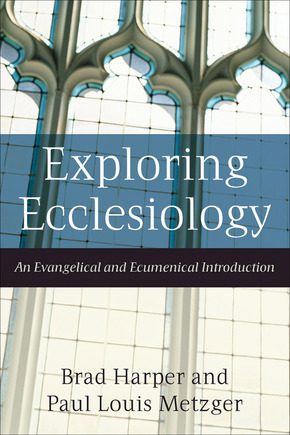 Contrary to what the word might sound like, ecclesiology is not a disease. Ecclesiology entails the doctrinal study of the church. The proper study of the church can help inform churches so as to nurture health and guard against spiritual diseases. This post originally appeared as “Between the Lines: A Conversation with Brad Harper and Paul Louis Metzger – Part 2″ at The Brazos Blog on 2/24/2014. The post reflects facets and values of the book I co-authored with Brad Harper titled Exploring Ecclesiology: An Evangelical and Ecumenical Introduction.
Contrary to what the word might sound like, ecclesiology is not a disease. Ecclesiology entails the doctrinal study of the church. The proper study of the church can help inform churches so as to nurture health and guard against spiritual diseases. This post originally appeared as “Between the Lines: A Conversation with Brad Harper and Paul Louis Metzger – Part 2″ at The Brazos Blog on 2/24/2014. The post reflects facets and values of the book I co-authored with Brad Harper titled Exploring Ecclesiology: An Evangelical and Ecumenical Introduction.
In the first post, Brad and I explained what ecclesiology is, why evangelicals should care about it, and how it affects how we experience the church. In what follows, we address what evangelicals can learn from other ecclesiologies and how ecclesiology can inform our worship and the role of women in our churches.
——————————————————————————————
What can evangelicals learn from other ecclesiologies?
Here again, we find a question with deep and broad implications. We often tell our students that if they want to do theology well they need to listen vertically (to two thousand years of church history) and horizontally (across the spectrum of traditions). From the Catholic and Orthodox traditions especially, evangelicals can learn that being a Christian is not just about inviting Jesus into our hearts as individuals.
It also entails being constituted and shaped by the saved community: in other words, the saved community is indispensable to our growth as believers. In the early church, if a person were asked what it means to be a Christian, his first response may not have been “I have accepted Jesus as Savior” but rather “I belong to them,” pointing to the church.
From the Pentecostal tradition, non-Pentecostal believers can be challenged to think about what it means that the church is the locus not just of the presence of the Holy Spirit but also of the Spirit’s unique activity.
Again, the list here could be long. If evangelicals wish to influence other ecclesiologies in the spheres of rigorous engagement of Scripture, personal spiritual formation, the priesthood of all believers, and evangelistic mission to the surrounding world, it would be good for us to learn from those in other traditions so as to communicate our values more effectively. Moreover, learning from the unique insights of other traditions helps us to become more well-rounded and so strengthen our particular strengths and remove our blind spots. Otherwise, unguarded strengths can often become glaring weaknesses.
How can ecclesiology inform our worship?
One of many ways that ecclesiology can inform our worship is in the area of worship styles and music, which have become a battleground for the evangelical church in the last several decades. The common practice of “traditional” and “contemporary” worship services often ends up separating the church along generational or consumerist lines. Instead, we need a strong understanding of the biblical principle that the church is meant to be a community that brings diverse persons together. What would it look like for the church to use music, worship, and liturgical styles that focused on bringing its generations together rather than allowing them to separate along preference lines?
Another area where ecclesiology can inform our worship is in the sphere of individual participation. All too often, praise choruses in evangelical circles emphasize the individual believer and fail to account for the community of faith. Individual believers are not the body and bride of Christ; only the community of believers constitutes the body and bride. While taking seriously the need for individual participation, we must also account for the fact that the whole is greater than the sum of individual parts.
Lastly, the study of ecclesiology will help us recognize the connection between the visible and invisible church. All too often evangelicals have emphasized the invisible church (those who are saved by faith) and have failed to account for the need to make visible our spiritual transformation. If evangelicals take seriously the connection between the visible and invisible church, it will help our movement come to terms with the pressing need to bring people from diverse ecclesial heritages and other backgrounds together in visible worship. Our oneness is intended to signify to the world God’s unity, God’s sending of his Son, and his love for the church in his Son (John 17:23). How else will we demonstrate to the world that we are one?
How can ecclesiology inform the role of women in our churches? 
One way ecclesiology can cause us to rethink the role of women in the church is to recognize the biblical idea that the church and the family are not the same institutions and operate by different structures. Too often, evangelicals simply collapse these two institutions into each other so that the relationships between husbands, wives, and children in the family are inserted directly into the church when, in fact, the church is built on a different structure. While the church is to recognize and respect the structure of the family, leadership in the church is built on issues of calling, gifting, and communal affirmation, not just on whether someone is a father, wife, male, or female. Regarding communal affirmation, we need to move beyond production and consumption language so often present in the church and society today. In view of the triune God of holy, communal love who saves and shapes the church, we are called to view men and women together in communal terms (not reducing them to mere producers and consumers) where we share in life and ministry together for the sake of cultivating deeper communion in the body. Much more work needs to be done in this area. But these points alone could have a major impact on the role of women in the church.













